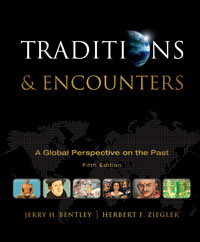Traditions and Encounters, AP Edition (Bentley), 5th EditionChapter 24:
New Worlds: The Americas and OceaniaOverviewThis chapter traces the devastating impact of European exploration and conquest on the societies in the Americas and on the Pacific islands. Those societies succumbed quickly under the combined pressures of European diseases and superior technology. By 1700, most of the western hemisphere had been claimed by western powers. Colonial societies were shaped by a number of considerations: - Conquests of the Aztec empire by Cortés and the Inca empire by Pizarro were swift and brutal. The Spanish empire brought the Indian empires of Mexico and Peru under royal authority, represented by the viceroy, and a small class of white landowners. Indigenous peoples were impressed into service in mines and on plantations.
- In Brazil, the Portuguese established a plantation society based on sugar mills. After the native population died off, African slaves were imported and forced to labor under brutal conditions.
- The earliest British and French colonies in North America centered on the fur trade and subsistence farming. Plantations in Virginia and the Carolinas were originally worked by indentured servants from Europe, but by the late seventeenth century, planters found African slaves to be a better investment.
- Catholic missions in Spanish and Portuguese colonies actively sought the conversion of native peoples. In North America, there were fewer contacts and more native resistance to conversion.
 | 
















